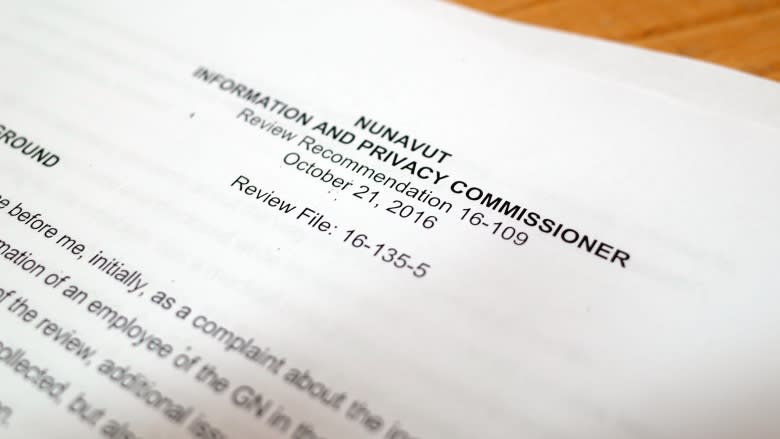Gov't of Nunavut coerced employee by withholding sick leave benefits, privacy commissioner says
The Government of Nunavut broke privacy law when it coerced an employee on sick leave to provide more personal health information than it was entitled to, and then shared that information between two departments.
That's according to a report not yet made public, but recently obtained, from Nunavut's Information and Privacy Commissioner Elaine Keenan Bengts. It includes six recommendations to the Government of Nunavut, following an investigation into a privacy breach complaint from a public servant some time in 2016.
Keenan Bengts's 26-page report found human resource staff broke three sections of the Access to Information and Protection of Privacy Act by demanding the employee's health care provider fill out a "functional abilities form." Staff then shared that information with the employee's department, where unresolved workplace conflict was at least partially to blame for his sick leave. According to the commissioner, the scope of that form "is far too wide" in this case and "needs to be amended."
"Further, the level of pressure put on the complainant in this case amounted to coercion, as he was being denied sick leave benefits until such time as he had [the form] completed," Keenan Bengts wrote in her report, dated Oct. 21, 2016.
Halfway through the commissioner's review of this case, the employee raised another concern: an unsigned letter from his health care specialist obtained by human resources without the employee's consent and then shared with his department.
That letter contained "very sensitive personal health information," Keenan Bengts wrote.
"I am extremely concerned about whether or not the specialist in this case had the necessary consent from the complainant."
Government responds
The finance department, which handles most of the government's human resources, responded to the report in a letter dated Feb. 1.
In that letter, the government said it fully accepts two of the recommendations, addressing the improper collection and sharing of employees' personal medical information.
The department also promised to review its practices in response to three other recommendations.
But the department refused to comment on the final recommendation: that the health department investigate how the finance department received more sensitive medical information than the employee consented to share.
"The Department of Finance cannot speak to or address any possible investigation which will take place within the Department of Health," the letter says, signed by an unidentified public servant.
In a recent interview, Commissioner Keenan Bengts said this case provides Nunavut an opportunity to think about the flow of personal medical information within the government.
"For that reason, I think it was a good exercise. And I think we made some inroads. Am I entirely satisfied with the public body's response? No. But it's a start," she said.
New form, no wrongdoings
The government was made more accountable in the process, associate deputy minister of human resources, Alma Power, said in a July 12 interview.
The form in question has been amended to align with the commissioner's recommendations, and employees now sign-off on information provided to human resources, Power said.
The health department also investigated the case and "did not find any wrongdoings," Alma said, but didn't provide any other details of that investigation.
When asked what measures are in place to ensure health care providers — who are either government employees or under contract to the government — don't feel pressured by their employer to hand over more information than a patient consents to, Power said doctors and nurses can file internal harassment complaints and are also bound by their own professional codes of conduct.
"They have a department that's very strong in protecting individuals' privacy," she said.
A recent privacy audit done by Keenan Bengts on Iqaluit's Qikiqtani General Hospital, released last fall, paints a different picture.
That audit found a lack of leadership on privacy issues at the hospital, disorganized patient files left unattended, and employees able to access their own medical information.
'Another case of bullying'
The whole case, said Iqaluit MLA Pat Angnakak, is another example of unresolved workplace conflict at the Nunavut government.
"This is another case of bullying," she said.
Angnakak said she has been in touch with the employee in this case.
"They were not at work for a long time, were just very stressed and… feeling that people didn't believe what he was saying."
The commissioner's report notes that the employee sought "a transfer or changes to the management structure in his workplace to remove some of the conflict which had led to his leave."
Angnakak said sources have told her that a manager involved in this unresolved conflict has faced numerous complaints from coworkers and was eventually transferred out of the department to an equal position in another department.
It's a story, Angnakak said, that she's heard from other public servants.
Though the Nunavut government has been found to break the law in this case, there are no consequences for a privacy breach laid out in the Access to Information and Protection of Privacy Act. However, an individual may choose to file a civil suit with the Nunavut Court of Justice.





